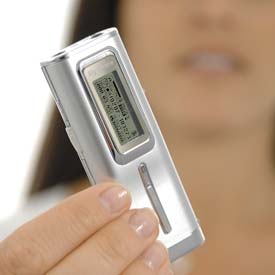
While I’ve already written an article about vocal projection, I don’t feel like I gave enough practical exercises that really work in helping one to improve their voice tremendously.
This article is strictly going to be about some of the best exercises and techniques you can use to transform your voice in 30 days.
Committing to 30 days of focus
Is this an area you feel that you need some work on?
If your answer is yes, make a decision that for the next 30 days you will put your focus on improving the quality of your voice. It takes 30 days to create a new habit, so if you truly commit to following what is in this article, you will see lasting improvements.
I’ve researched and tested tons of exercises and techniques in my journey to improve my own voice quality. I’ll share the most practical and helpful things that worked for me.
As I wrote in my Vocal Projection article, the power and clarity at which you speak is one of the most overlooked aspects of highly effective and attractive communication; yet it’s one of the most important.
So let’s get to the exercises.
The first exercise is a simple but super effective in refining your voice.

Recording your voice
The best way to start strengthening your voice is to bring in some awareness of what you’re beginning with.
The way that other people hear our voice it is a bit different that how we hear it. The first time I heard the way I talked on a home video, I was surprised at the sound of my voice.
So all you need for this exercise is something to record your voice with, and if you don’t have one you can use your computer or the video capture part of your digital camera. Just make sure that whatever is recording your voice will play it back with substantial quality.
I have an application on my cell phone that I use to record my voice. For those of you who have a cell phone with this feature, I have found that this works pretty well for this exercise.
With your voice recorder, press the record button and pretend you’re having a conversation with one of your friends or coworkers on the phone. It’s important here to speak like you normally do when you’re not thinking about your voice.
After you have finished recording, play it back and measure yourself from a scale of 1-10 in each of these areas (I recommend getting a friend to rate you because we tend to rate ourselves higher):
There are three key areas that you should focus on. For practical purposes, if you cover these three areas than you really cover everything you need for your best voice.
Clarity/enunciation (1-10)
Is your voice clear and sharp or do you slur your words?
Some great exercises to practice clarity and enunciation is to:
- Exaggerate the mouthing of the words you are saying
- Place a pencil horizontally in your mouth between your teeth and read in a clear understandable voice
- Record or practice saying tongue twisters out loud until each word is clearly audible
Energy/Volume (1-10)
Volume and energy are naturally intertwined, because when you speak with energy and confidence in your voice, the volume of your voice naturally rises with it to meet the situation.
This is very important because people who inject energy and expression into their voices are though to be more creative, confident, and credible. When you don’t pepper what you’re saying with expression and emotion, you risk losing the attention of the listener. And a monotone delivery can make you come off as boring or nervous.
Listening to your recording..
- Do you feel that your voice exudes power and confidence?
- Does your voice express a healthy amount of energy and exuberance?
- Do you sound certain or confident?
- Do you sound passionate or excited?
Rate yourself higher for these positive traits.
Rate yourself lower for things like low energy, sounding tired, stuttering, and uncertainty.
For example, when you’re at a restaurant or public setting, do you have to constantly repeat yourself or forcefully raise your voice?
If so, there is work to be done in this area.
Resonance (1-10)
Do you wish your voice had a deeper, richer, rounder sound? Resonance is what makes your voice sound richer and more masculine.
Our “box” for resonating(or vibrating) sound is the chest, throat, mouth, and nasal cavities. Because we all vary in size, we all sound different.
Try this exercise: Make a high pitched noise, and slowly go down into a deeper sound. You’ll feel your voice resonate from your throat down to your diaphragm. This is where the bass lies.
Studies have shown that women find men with deeper voices more attractive. You don’t need to sound like Barry White but you should work on speaking deeper if your voice is very high pitched or squeaky. Ask a good friend where you range on the 1-10 scale. 1 sounding like Alvin and chipmunks, and 10 sounding like the movie trailer guy. Okay maybe not exactly, but you get the point.
Working it into your life:
Within these thirty days, think of habits you can build that will keep you working on your voice consistently. I record daily memos and reminders on my phone, and this is how I consistently monitor the sound and strength of my voice daily without really thinking about it.
If you don’t take this kind of consistent action, it WILL revert back to your comfortable, old voice.
Another thing that I like to do is to talk out loud whenever I’m alone or whenever I get a chance. If you’re driving in your car, talk to yourself out loud. Also, with the amount of texting and e-mail people do these days, some people can go a whole day without speaking a word to people.
This is not for you, instead of texting that person back and forth, call them and settle it on the phone. Instead of writing someone a long e-mail, just call them and tell them the main points. Instead of just asking for milk in your coffee, start a conversation with the barista at the cafe.

Visualization Exercise
This is a simple but powerful visualization tool that you can use daily:
Every time you are talking to someone, imagine that when you speak, you can actually see the sound waves traveling towards the direction you are facing.
I like to visualize them in waves shaped like rings (like the picture above), but you can visualize them however you want.
So imagine it like this:
The volume of your voice determines how wide your sound “rings” or waves are. This enables a wider range of people to hear what you are saying.
Your enunciation and the sharpness in your voice determines the strength of the rings. Picture blowing smoke rings – when you speak with more strength picture the rings being more solid and thick rather than loose and wispy.
A great way to cover all areas is to imagine that the person you are talking to has ears in the back of their head. Imagine that the only way that they can hear you is if you bounce your voice off the wall behind them, so that it enters their ears. So throw your voice at the wall behind them like a ball that will bounce back.
You shouldn’t be yelling, but just making sure you can be heard.
I always visualize a target 20 feet ahead of me, and throw my voice AT the target, imaginging hitting it with my voice.
A great way to practice this is to talk to your friend across a city street, and have a conversation while walking on opposite sides of the street.
I use the 20 feet target visualization when I’m in a crowded place and it’s really loud, or when I’m outside in a city area. I bring it down to 10 feet when I’m in a quieter place.
Of course, you have to practice adjusting your vocal projection to the setting you are in. But if somebody says you are being too loud, then take it as a compliment, and calibrate accordingly. If you’ve never been told to quiet down, perhaps you want to make it your goal to hear that within the next 30 days.
Setting yourself up for success
Even though studies show that it takes 30 days to lock in a new habit, it does not mean that after 30 days, you will automatically be “fixed” and you don’t have to think about it anymore. What matters is the kind of habits you build. The habits you create should be ones that make you inevitably improve the strength of your voice every single day.
These habits include warming up your voice in the car on the way to meeting your friends, consistently recording yourself and talking outloud, and any habits that will consistenly help you build your most powerful communication tool.
Also, work on your voice gradually. If you try to change your voice completely, not only will your friends look at you like you’re on something, it’s going to be really hard to keep up.
Make sure to drink plenty of fluids. Sometimes it’s dehydration that makes your voice sound weak or hoarse.
Speak from your belly. When you speak, you should be feeling the power come from your belly area, through your lungs, and not just from your throat.
After your have finished your 30 days, come back and send me some of the realizations you’ve had about your voice, any improvements you’ve made, and anything else you want to share in the comment section! Looking forward to hearing from you!



Finally, thanks 🙂
Jae,
This is an excellent, useful article. Thank you for the excellent tips, well explained and in depth. Using your voice is definitely one of the most powerful ways to project confidence – thanks for setting me homework 😉
Anthony
Wow, this is such a great article. I struggle with effective communication– I spend so much time thinking about the words I’m going to say and trying to put words to the thoughts I’m having, that I have little time left to focus on delivery.
Some people (me included) also seem to have a more limited vocal range for speaking than other people do. I recall a friend back in highschool who couldn’t seem to inflect his vocal pitch– instead he simply changed the loudness with which he was speaking. Needless to say he was very tiresome to listen to, and, as a result, few people were interested in what he said– nevermind that he had many good things to say, he simply had no skill in conveying them.
Effective speech incorporates pauses, inflection (speech is music), emotion, not just content. These are some great suggestions, Jae. Other musings I’ve had on this subject–
-I noticed my range and ability to project (simply speak louder so people can hear you better) improved during the seasons when I was in choir at church.
-Am considering practicing simply by reading books out loud to myself. Pick something more intellectually heavy like Edgar Allen Poe or Shakespeare so you don’t get bored reading at speech-pace.
-Slowing down can give lots of effect too– don’t slow down too much or people will see through it, but if we talk slower we’ll have more time to think about all these things you suggested, until they become second nature. As an engineer, I usually get excited about what I’m talking about– and become more focused on conveying information quickly, rather than persuading effectively.
Some great food for thought in this post Jae, as always.
Thanks Anthony, glad to share! Tell me how it goes 😉
Hey Prailurus, reading books out loud is a great idea for working out your voice – while incorporating it into your daily life! I agree with incorporating pauses, emotion, and putting emphasis on certain words, I talked about that in my last article – avoiding a monotone delivery is very important as well.
Thanks for sharing!
Great stuff Jae!
As usual you never cease to impress me.
I absolutely, 100% agree with Jae on this. One of the most critical, and the most over-looked aspects of the impression we make upon others in the world. Or, it’s not just what you say, it’s how you say it.
Excellent article, sir.
Would James Earl Jones even be noticed if it were not for his fantastic delivery? Get on YouTube and track down every Richard Burton video you can, the man was a master. Listen to Will Smith vs. mush mouthed gangsta rappers. There are so many many examples.
If I may, Jae, I’m going to add two pet peeves to this discussion, and I hope it does evolve into a robust discussion … watch your language, gentlemen. Eliminate those sayings, phrases and words that mark you as, well, coarse. There absodamnlutely is a time to effing curse like a British rocker who just hot kicked out of a club, but it’s rare and the more vulgarity is used, the less impact it has. Save the bad stuff for when you … really … really … want to punctuate your heat.
And NEVER end a sentence with a proposition. If I hear Where’re You At? one more time, I may start shooting people. I even heard Tom Brokaw say it one night on the news. Where Are You? The at is ridiculous besides grammatically hillbilly.
An accomplished speaker with graceful delivery, interesting rhythms, excellent inflection and diction and most of all using the full range of the most perfect instrument God created .. your voice .. can get further faster than a dipstick who has all the answers but speaks like a street corner thug.
This is really insightful, detailed advice, much appreciated!
No feedback on the content yet, but on the delivery, I suggest dividing this up into a plan of day 1: do exercises a, b, c (or week 1). just something other than “here is all the information in one post”; giving a little more structure would help a lot since it’s a 30 day thing.
Very nice article. I really appreciate it. I have already started this challenge today. I am really looking forward to your future articles in the how to series. Thanks for your time man.
Great article, Jae. By pure coincidence, vocal projection is something I am working on at the moment. Some other helpful things I have found:
– Using the skype testing call service each time I make a phone call (this is a short 10-15sec recording to test sound quality)
– I like reading (novels, journal articles, online news). When alone I read out loud and record – this too is very useful.
– As you mentioned above, I am making more phone calls than sending texts now
This new series is a great idea – looking forward to the next 30-day block.
Sure, ‘Where you at?’ isn’t proper, but when I hear someone say that, I rarely think, “Boy, what a dumb hillbilly.”
Mush mouthed gangsta rappers? Well, that’s why they’re selling albums no? Would 50 cent get any street cred if he walked around sounding like the Dave Chappelle version of Lil Jon? Will Smith may be more likeable, but some people don’t care to be percieved as a gentlemen.
There is a difference between people who speak eloquently and people who speak to the heart of the people. A good speaker should be able to change their style depending on their audience. Usually the most effective way to reach people is to use their language.
I agree with 99% of what you’ve said. I’m also against people swearing for no reason. That’s no reason to judge people. Your post came out pompous if you ask me.
I found a breathing exercise called 1:4:2. As explained on the website below, what you do is you inhale in for one count, hold your breath for four counts and then exhale for tw counts. For example, if you inhale for 4 seconds, you hold your breath for 16 seconds and then exhale for 8 seconds.
Repeat the process at least 8 times and preferably 12. Aim to do this process 3 times a day. Remember breath in slowly and deeply, completely filling the lungs. When you exhale, breath out slowly and empty the lungs again.
I’ve found that if you also combine holding in your breath with exercising your diaphragm, you can achieve a deeper voice and greater energy level, which is great!
How Does it Work?
It’s very simple. This process oxygenates your blood i.e. it increases the amount of oxygen the blood is carrying to the cells of your body. The more oxygen your cells have oxygen to, the more energy your body will have. You are also increasing your lung capacity making it possible for the maximum amount of oxygen you inhale to increase over time.
Other Important Health Benefits
What you are doing here is stimulating the body’s lymph system. Unlike our blood, the lymph system does not have a pump (heart) to push the lymph fluids around our body. This deep breathing exercise does the trick perfectly!
The lymph system removes toxins from our body and we increase it’s capability with this exercise. Every time you perform deep breathing you will be stimulating the flow of the lymph and sending it on its way to to cleanse your insides. It removes toxins which are then expelled from our bodies through our waste channels, mucus or our skin.
This is extremely valuable. It is important to note that if our lymph system were shut off for just 1 day we would die as a result of trapped toxins. Also, the lymph system destroys bacteria, viruses and abnormal cells, such as cancer cells. The lymphatic system also boosts our immune system leaving us less vulnerable to sickness.
The whole process will leave you positively buzzing!
Keep this up! Loving it and visiting the site everyday to see any new articles.
Dude ! I can’t wait for your next post.
Work in progress…
Again, another great article on Kinowear. Vocal projection and presentation skills are amongst the most crucial skills to hone in business today. Thank you for the great tips, my business gets better every day! -Paul
GREAT GREAT ARTICLE, have always been concerned about my voice when I speak and its always been an issue to me especially after realized people often asked me to repeat myself( showing I was not clear enough)
So I read this book on voice lessons and I believe in addition to this article- my voice will be on track again. Thank you for the post.
I for a large portion of my childhood stuttered. It was not something that happend on every single sentence I spoke, but it was terribly frustrating and kept me away from socializing and being confident. I’ve somehow with great patience learned to pace my words and thoughts, and have completely eliminated my stutter, great accomplishment for myself. But, my more recent problem , that i’ve had throughout the past 7 years, is clearity. I slur sentences and words together without noticing it most of the time, words are not enuciated when I speak, people usually more than often have to say ” what” at least 2- 15 times throughout a hour conversation. my tone is monotone at times when my confidence to speak goes down. I notice one thing interesting though. when I have to give a presentation infront of my classmates, I put on this alter ego sort of, and magically, my slurred speech, monotone voice projection is all gone. I just wished I could always harness that inner james bond in me when I wanted it. I have been a reader of this site for a very long time now, and this article is much appreciated. its been 2 days and i’ve already notice significant improvement in my speech. the biggest change i’ve notice from practicing with a pen in my mouth, and reading slowly to grab each and every words pronouciation perfectly. i look forward to continue, great article once again Jea
I made this change where I now speak more from the diaghram and my voice now sounds so much deeper and smoother. Its related to how you learn to breath too!
Thanks a bunch for posting this for free. I swear, hardly anybody is willing to be so generous. My problem is not the deep voice–I have that. My problem is the projection and energy. I find your tips very useful, especially the practicing in the car. The car is a nice personal booth were you can talk loudly and shout without disturbing or weirding out your room mates. But I need to work on daily practice. Thanks again for the insight.
Thank you so much for your knowledge.
You’re welcome! Thanks for dropping by our blog.